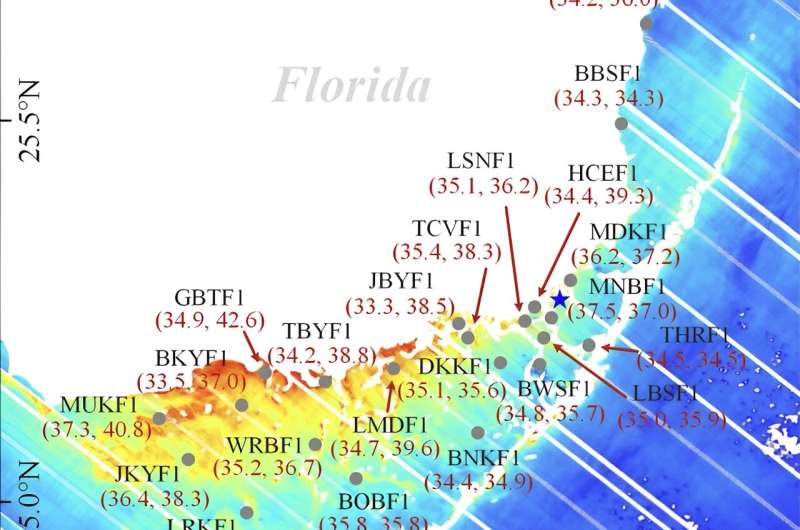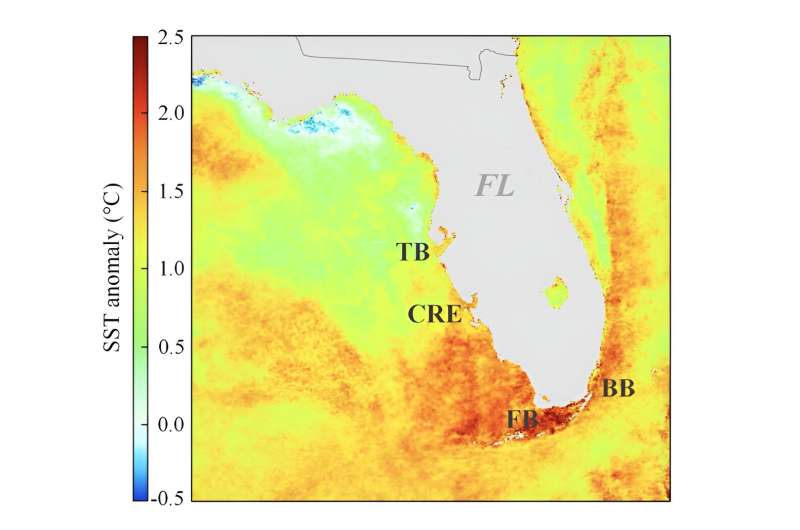This article has been reviewed according to Science X's editorial process and policies. Editors have highlighted the following attributes while ensuring the content's credibility:
fact-checked
peer-reviewed publication
trusted source
proofread
South Florida estuaries warming faster than Gulf of Mexico, global ocean, research shows

Sea surface temperatures are on the rise around the world, but the problem is pronounced in South Florida, according to a series of studies published by researchers at the University of South Florida College of Marine Science.
Estuaries in South Florida have experienced rapid warming over the past two decades, including a record-breaking marine heat wave in 2023.
Using satellite data, the researchers found that sea surface temperatures in four estuaries in South Florida have risen faster than sea surface temperatures globally and in the Gulf of Mexico. The findings, published in Environmental Research Letters and Estuaries and Coasts, paint a troubling picture for the marine life that calls Florida home.
"The temperatures in South Florida estuaries are not only rising faster than the global average, but also faster than temperatures in the open Gulf of Mexico," said Chuanmin Hu, professor of physical oceanography at the University of South Florida and co-author of the recent papers. "We even saw more of a response within the estuaries to last year's marine heat wave."
Over the past two decades, sea surface temperatures in Florida Bay, Tampa Bay, St. Lucie Estuary and Caloosahatchee River Estuary rose around 70% faster than the Gulf of Mexico and 500% faster than the global oceans, according to the authors. The temperatures are expected to take a toll on marine life.

Estuaries are nurseries where many marine animals begin their lives. South Florida's estuaries are home to critical habitats such as seagrass meadows, and adjacent waters in the Florida Keys are home to world-renowned coral reefs. These may be impacted by rising water temperatures.
"Algae, seagrass and coral are all sensitive to temperature changes," Hu said. "Algae prefer warm water, which can increase the size and frequency of blooms. Meanwhile, seagrass and coral undergo stress if the water gets too warm."
The researchers hope to partner with colleagues at the Florida Fish and Wildlife Conservation Commission and the National Oceanic and Atmospheric Administration to explore the potential impacts of water temperatures on seagrass and coral populations in South Florida.
The researchers speculated on possible causes for the high rate of warming in South Florida's estuaries, including evaporation, water capacity and residence time (the amount of time water spends in an estuary). No single factor has been revealed as dominant.

Ongoing research by Hu and Jing Shi, a doctoral student in Hu's lab and first author of the papers, will investigate another peculiar observation: the accelerated warming seen in South Florida's estuaries has not been detected in other estuaries across the region.
"Not every estuary around the Gulf of Mexico is behaving this way," Hu said. "These temperature changes appear unique to the estuaries of South Florida."
The next question, Hu said, is how long this faster warming in South Florida will be sustained.
"We expect the rate of warming to eventually balance with the open Gulf of Mexico," he said. "We just don't know when that will happen."
More information: Jing Shi et al, South Florida estuaries are warming faster than global oceans, Environmental Research Letters (2022). DOI: 10.1088/1748-9326/aca8ba
Jing Shi et al, Temperature Response of South Florida Estuaries to the 2023 Heatwave, Estuaries and Coasts (2024). DOI: 10.1007/s12237-024-01400-4
Journal information: Environmental Research Letters
Provided by University of South Florida




















